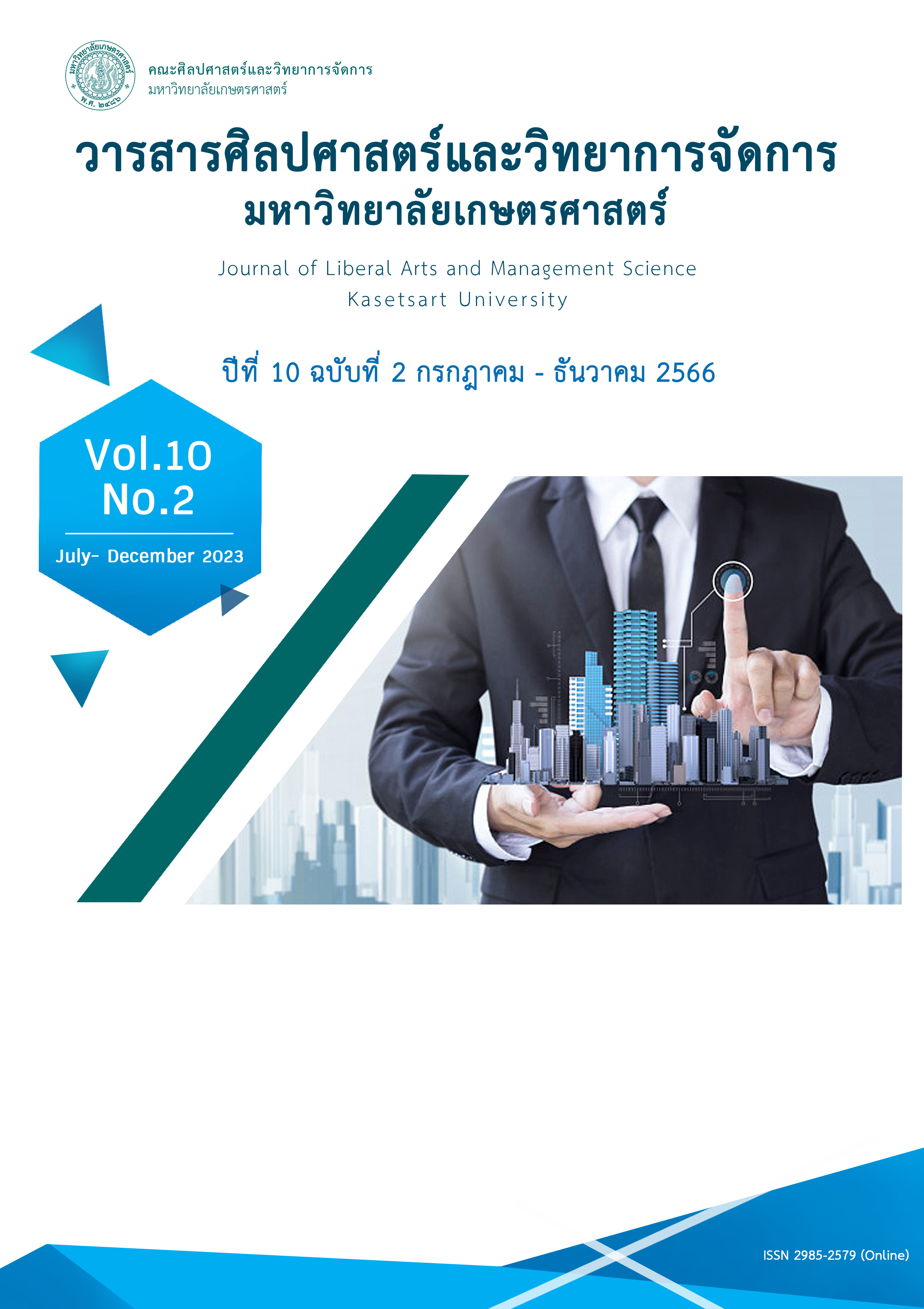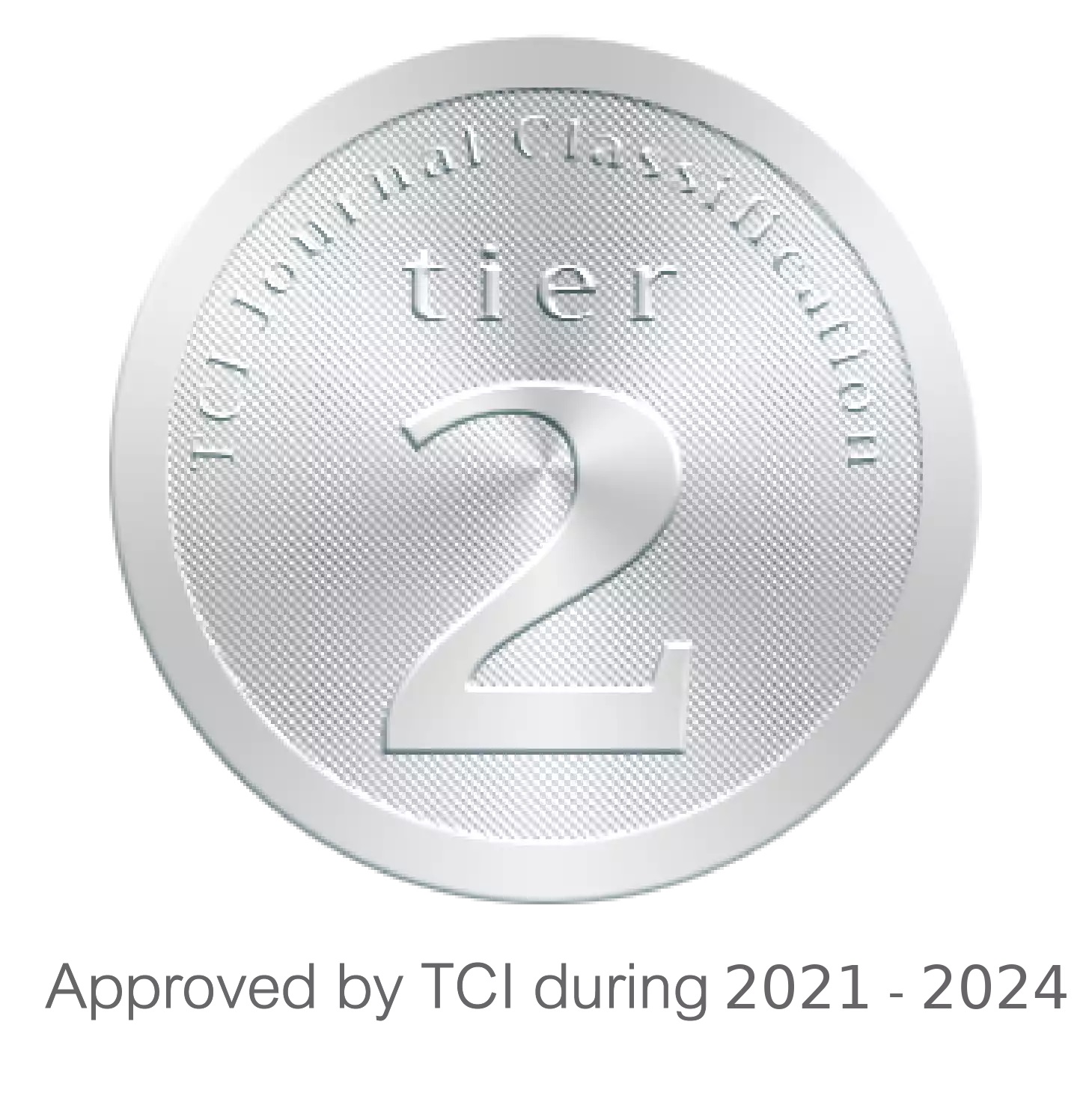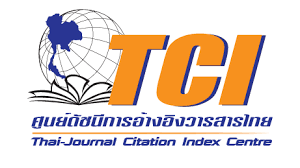การยอมรับการใช้กระเป๋าเงินอิเล็กทรอนิกส์ในยุคสังคมไร้เงินสด
คำสำคัญ:
การยอมรับเทคโนโลยี, กระเป๋าเงินอิเล็กทรอนิกส์, สังคมไร้เงินสดบทคัดย่อ
ประเทศไทยเป็นประเทศในระบบเศรษฐกิจของตลาดเกิดใหม่อยู่ในช่วงปรับเปลี่ยนสู่สังคมไร้เงินสด เทคโนโลยีสำหรับธุรกรรมทางการเงินแบบไร้เงินสดมีบทบาทมากขึ้นในชีวิตประจำวัน โดยเฉพาะอย่างยิ่ง กระเป๋าเงินอิเล็กทรอนิกส์ อย่างไรก็ตาม การยอมรับธุรกรรมการเงินแบบไร้เงินสดอย่างกระเป๋าเงินอิเล็กทรอนิกส์ของแต่ละบุคคลมีความแตกต่างกัน การศึกษานี้จึงมีวัตถุประสงค์เพื่อศึกษาภาพรวมของกระเป๋าเงินอิเล็กทรอนิกส์ในประเทศไทยและเพื่อศึกษาการยอมรับกระเป๋าเงินอิเล็กทรอนิกส์ โดยการทบทวนวรรณกรรมอย่างเป็นระบบ ภาพรวมการใช้กระเป๋าเงินอิเล็กทรอนิกส์ในประเทศไทยพบว่า ภาครัฐและภาคเอกชนขับเคลื่อนสังคมไร้เงินสดส่งผลให้ผู้บริโภคนิยมใช้กระเป๋าเงินอิเล็กทรอนิกส์มากสุดในภูมิภาคเอเชีย อย่างไรก็ตาม ผู้บริโภคยังมีความกังวลเรื่องความปลอดภัยในการใช้งาน สำหรับการศึกษาการยอมรับกระเป๋าเงินอิเล็กทรอนิกส์จากฐานข้อมูลการวิจัยกลางของประเทศไทยทั้ง 11 บทความอยู่บนพื้นฐานทางทฤษฎี ได้แก่ แบบจำลองการยอมรับเทคโนโลยี (TAM) และทฤษฎี UTAUT2 เพื่อศึกษาการยอมรับของผู้บริโภคในประเด็นความตั้งใจใช้กระเป๋าเงินอิเล็กทรอนิกส์เป็นหลัก ตัวแปรอิสระอย่างการรับรู้ประโยชน์ถูกใช้ในการศึกษาจำนวนมาก ตามด้วยการรับรู้ในความง่ายและอิทธิพลทางสังคม นอกจากนี้ ปัจจัยที่มีอิทธิพลต่อความตั้งใจใช้กระเป๋าเงินอิเล็กทรอนิกส์มีหลายปัจจัย อาทิ การรับรู้ประโยชน์ การรับรู้ในความง่าย และอิทธิพลทางสังคม ผลการศึกษาที่ได้เป็นองค์ความรู้ เพื่อเตรียมพร้อมสู่สังคมไร้เงินสดอย่างเต็มรูปแบบ และเป็นการต่อยอดองค์ความรู้ทางวิชาการได้
##plugins.generic.usageStats.downloads##
เอกสารอ้างอิง
Aji, H. M., Berakon, I., & Husin, M. M. (2020). COVID-19 and e-wallet usage intention: A multigroup analysis between Indonesia and Malaysia. Cogent Business & Management, 7(1), 1-16.
Apasrawirote, D., Chemsripong, S., Rurkwararuk, W., & Asawasakulson, A. (2019). The moderating effect of small business staff's perception on the intention to use cloud computing technology, using SEM. Journal of Business, Economics and Communications, 14(3), 85-104.
Apirungruengsakul, N., & Pooripakdee, S. (2018). A Confirmatory Factor Analysis Of Factors Affecting The Intentionto Use Mobile Wallet. Panyapiwat Journal, 11(2), 30-43.
Bank of Thailand. (2021). Payment behavior through Payment Diary. Retrieved 29 October 2023, from https://www.bot.or.th/Thai/PaymentSystems/Publication/payment_insight/ Documents/Bi-monthly_report_Vol11-2021_October.pdf
Chaveesuk, S., & Vongjaturapat, S. (2012). Theory of the acceptance of use information technology. KMITL Information Technology Journal, 1(1), 1-21.
Crowdabout. (2022). พฤติกรรมการใช้จ่ายผ่าน E-wallet ของปี 2565. Retrieved 27 December 2023, from https://crowdabout.io/blog/electronic-wallet/
Fabris, N. (2019). Cashless society–the future of money or a utopia?. Journal of Central Banking Theory and Practice, 8(1), 53-66.
Finance-Rumour. (2020). What is an e-Wallet (Electronic Wallet)? How does it work? Retrieved 20 October 2023, from https://www.finance-rumour.com/money/what-is-e-wallet/
Gorshkov, V. (2022). Cashless payment in emerging markets: The case of Russia. Asia and the Global Economy, 2(1), 1-10.
HuaPood. (2021). What is an e-Wallet in Thailand, which ones are worth using in 2021? Retrieved 20 September 2023, from https://www.huapood.com/เงิน/แรงบันดาลใจการเงิน/การเงินรู้แล้วดี/e-Wallet-คืออะไร-ในไทยมีเจ้าไหนบ้างที่น่าใช้
Jensathien, T., & Chaichotchuang, Y. (2023). An analysis of path analysis causal relationship of intentionon use electronic payment technology (E-Wallet) in Bangkok. Ph.D. in Social Sciences Journal, 13(2), 369-383.
Kasikorn Research Center. (2022). How to use mobile banking and E-Wallet to keep (money) safe? Retrieved 3 November 2023, from https://www.kasikornresearch.com/th/analysis/k-social-media/Pages/Mo-BK-Ewallet-Vid-14-02-22.aspx
Lew, S., Tan, G. W. H., Loh, X. M., Hew, J. J., & Ooi, K. B. (2020). The disruptive mobile wallet in the hospitality industry: An extended mobile technology acceptance model. Technology in Society, 63, 101430. https://doi.org/10.1016/j.techsoc.2020.101430
Lwin, T. H. H., & Thanabordeekij, P. (2019). Factors Influencing The use of mobile wallets in Myanmar. Panyapiwat Journal, 11(3), 30-41.
Marketeer Online. (2021). e-Wallet: Online wallet using without cash. Retrieved 26 September 2023, from https://marketeeronline.co/archives/212889
Rahman, M., Ismail, I., & Bahri, S. (2020). Analysing consumer adoption of cashless payment in Malaysia. Digital Business, 1(1), 1-11.
Rathore, H. S. (2016). Adoption of digital wallet by consumers. BVIMSR’s Journal of Management Research, 8(1), 69-75.
Sachdev, N. (2019). The evolution of ewallets: history, benefits and withdrawals. Retrieved 26 October 2023, from https://sociable.co/mobile/evolution-ewallets-history-benefits-withdrawals/
Saetim, S. (2021). Factors affecting behavioral intention to use the mobile wallet of students in prince of Songkla University, Trang Campus. Parichart Journal Thaksin University, 34(3), 87-104.
Sammasut, T., & Witoonphan, N. (2021). The factors that influence the decision using electronic money (E-Money) TrueMoney Wallet at Pattaya City. Humanities and Social Sciences Journal, Ubon Ratchathani Rajabhat University, 12(2), 296-308.
Singh, N., Sinha, N., & Liébana-Cabanillas, F. J. (2020). Determining factors in the adoption and recommendation of mobile wallet services in India: Analysis of the effect of innovativeness, stress to use and social influence. International Journal of Information Management, 50, 191-205.
Sittitham, S., & Sangmahachai, K. (2021). The influence in acceptance and use E-Wallet system on the behavior of using financial services. KKBS Journal of Business Administration and Accountancy, 6(1), 138-154.
Sookto, A. (2021). Cashless society. Retrieved 26 September 2023, fromhttps://library.parliament.go.th/th/radioscript-rr2564-may5
Sripana, M. (2019). The cashless society situation in Thailand. Retrieved 15 October 2023, from https://www.senate.go.th/document/Ext22526/22526772_0002.PDF
Statista. (2023a). Number of cashless transactions worldwide from 2013 to 2021, with forecasts from 2022 to 2027, by Region. Retrieved 17 October 2023, from https://www.statista.com/statistics/ 265767/number-of-cashless-transactions-worldwide-by-region/
Statista. (2023b). Share of respondents who indicated they use mobile wallet in different countries and territories in the world in 2022. Retrieved 17 October 2023, from https://www.statista.com /statistics/1391056/mobile-wallet-penetration-worldwide-by-country/
Suksrichavalit, K., & Intuluck, W. (2020). The influence of online marketing factors and technology adoption factors on acceptance of payment services via the True Money Wallet application of subscribers in Bangkok. Dusit Thani College Journal, 14(1), 404-418.
Sukwadi, R., Caroline, L. S., & Chen, G. Y. H. (2021). Extended technology acceptance modelfor Indonesian mobile wallet: Structural equation modeling approach. Engineering and Applied Science Research, 49(2), 146-154.
Tarathonrungreung, J., & Pattanarangsun, P. (2021). Factors affecting the interest in using libra cryptocurrency. Journal of Business, Economics and Communications, 16(2), 107-122.
Techaworakhunsiri, T., & Pongsamran, S. (2023). The E-Wallet use behavior of the elderly. Journal of Administration and Social Science Review, 6(3), 129-140.
Thaker, H. M. T., Subramaniam, N. R., Qoyum, A., & Hussain, H. I. (2022). Cashless Society, E-wallets and Continuous Adoption. International Journal of Finance & Economics. 28(3), 3349-3369.
Therdthaveadej, N. (2016). Cashless society: Preparing to cashless society. Retrieved 20 October 2023, from https://www.scbeic.com/th/detail/product/2602
Uthaipan, K., Bantao, N., Sirisom, P., & Suwanna, N. (2021). Factors affecting usage behavior of electronic wallet for the goods purchasing of consumer in Maha Sarakham Province. Southeast Bangkok Journal, 7(2), 139-155.
Wongyara, W. (2020). Factors affecting actual usage of E-Wallet through super apps: Case study of rabbit line pay and grab pay. Journal of Information Systems in Business (JISB), 6(3), 11-28







